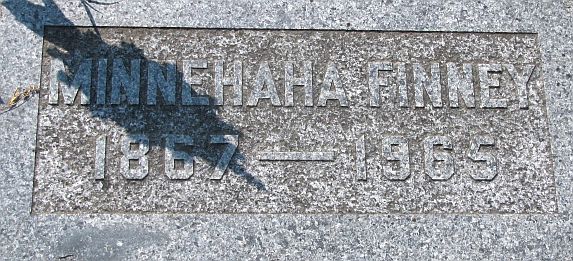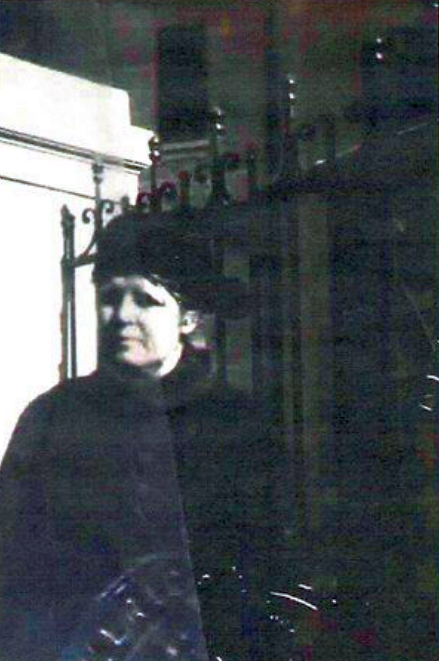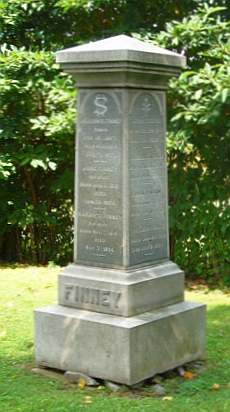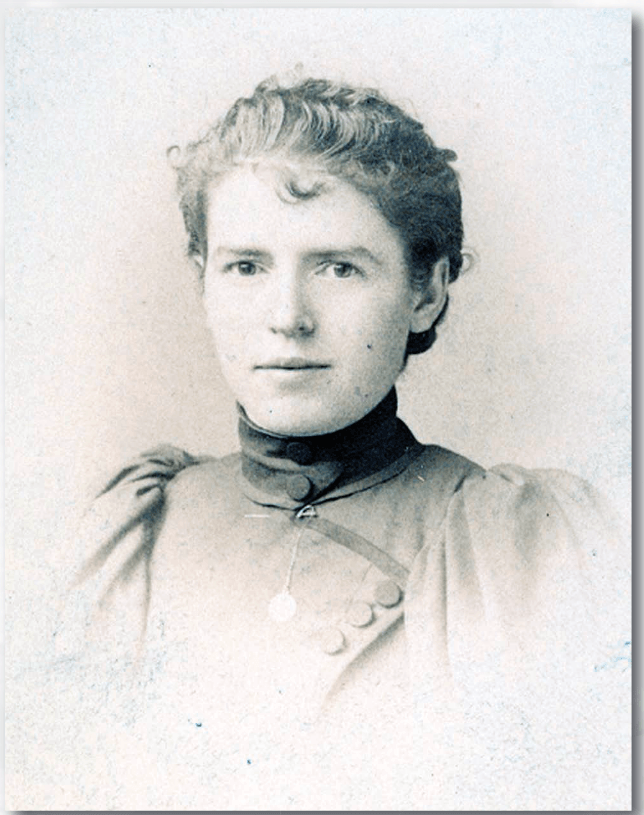
Many of us are not fond of our own name, though others may think it is grand. But somehow I think there are very few who would desire a name such as Minnehaha Finney.
On the other hand, the name catches the eye, it is decidedly different! The very name itself makes us want to learn about the woman. And, we want to know what she looked like.
A Little Background
Here is an excerpted history of the life of Minnehaha Olive Finney, including a terrible tragedy that involved her family when she was yet a child, as told by a relative:
Minnehaha was born at Pittsburg, Carroll County, Indiana, January 24, 1867. She graduated in the High School at Beloit, Kansas, in 1886, in a class of fifteen, receiving one half the first honor. After teaching school successfully for a few years, she entered Tarkio College, at Tarkio, Missouri, in 1888, and in three years graduated in the scientific course—in June, 1891.
The following year she taught in the Public Schools at Red Oak, Iowa. In the fall of 1892 she went to Knoxville, Tennessee, to teach in the College for the Freedmen in that city. In 1894 she was appointed by the Board of Foreign Missions of the United Presbyterian Church as a missionary to Egypt.

My Interest in Ms. Finney
Minnie’s father’s line crossed paths with the Stewarts, as my Ayres line does, although in my case only in an extended way. Jacob “Bucher” Ayres, based on his wife’s line and family research, penned a booklet about the Royal Stewarts, which can be read here.
The booklet is not easy to obtain, and the one copy I was kindly given contained annotations throughout by (guess who?) Minnehaha Finney. The original content and the annotations were separable only by careful reading and observation. The annotations were given a different font color in the online booklet.
But back to Minnie Finney and the terrible events that were to occur in her life.
A Terrible Tragedy

The following text was also written by a relative:
Mr. [William Stewart] Finney was a farmer. His home was near Mansfield, Ohio. [He was the grandfather of Minnehaha Finney.] He had been born 18 December 1807.
It was Thursday night, 07 December 1877. The weather was cold and bracing. There were two families occupying the house of William Finney, living in different apartments. After the usual family devotions, each family had retired to rest;—the son, Rev. J.P. Finney, a little earlier than common. Very soon all were quiet and in the enjoyment of peaceful slumber.
Away in the dead of the night a strange noise was heard by the younger family, in the room where the aged couple had retired for repose. Mrs. Finney supposing that some one was sick, quickly arose, approached the door which led to the room where the old folks slept, found it open and saw the outline of a man; but, not recognizing him as a stranger, went on, and in a moment was struck and felled to the floor in an unconscious state.
Then a rush was made for the bedroom where she and her husband slept. He had just risen in his bed, when he was struck a terrible blow on his side, breaking the butt of the gun. When, in a moment, he saw a second stroke about to follow, he grasped the musket; and in the struggle for life, wrenched it from the hands of the would be assassin. In the struggle, however, he received a severe blow just over the right eye.
At this juncture, Mr. Finney, supposing his wife to have been killed, ran quickly upstairs to arouse a hired man and prepare if necessary for a further defense. His daughter, Minnehaha, then only ten years of age, was lying on a lounge near the stairway. With a lamp in his hand, in search of Mr. Finney, she distinctly saw the face of a [man] who lived in the neighborhood,—one she knew well too. She plainly heard him say “Where is he gone?” and, strange though it may seem, she kept perfectly quiet.
It was feared that the intruder had accomplices, and that he was not alone in his nefarious work. So the two up-stairs talked loudly about the use of revolvers and muskets, though no such weapons were in their possession. This is supposed to have frightened the [man], and so he soon decamped, as he entered the house, through a raised kitchen window.

In the meantime a window was raised in the room above, and the cry of murder, oft repeated, reverberated through the stillness of the night to arouse if possible some one in the neighborhood. In a little time the men went down-stairs, and when the younger Mrs. Finney, coming to consciousness, saw the face of her husband covered with blood, she exclaimed, “Mr. Finney, what does this mean?”
Herbert, their oldest son, then only about nine years of age, asked his mother what they should do. She replied, “We can only pray.” He said at once, “I have been praying.” Mrs. Finney had a cut on her head of two or three inches, inflicted by the blow of a musket.
On going into the bedroom below they found the elder Mr. Finney lying in an unconscious state, clotted over with blood, yet still breathing. His wife, unconscious too, was wandering about in an adjoining room and calling feebly for help. There was a terrible gash across the left side of her face, from which the blood still continued to flow. Such was the state of things in the usually quiet home of Wm. S. Finney and son, a little past midnight of December 7, 1877.
The hired man was sent at once to give the alarm among the neighbors. Dr. Craig, the family physician, was promptly summoned; the police of Mansfield were informed of what had taken place and their services requested without delay. The physician arrived at 2:30 a.m., just in time to see Mr. Finney breathe his last. Mrs. Finney, having received a fearful blow on her face, complained of a feeling of chilliness, and but little could be done for her, except to restore natural heat, until the next day.
For several days she seemed unconscious of what had taken place, or what was going on around her. Crowds gathered at this home early the following morning to ascertain the character of the injuries received, to give needful help and show sympathy for the afflicted families. The funeral, arranged for Saturday, the ninth, was largely attended and the body quietly laid to peaceful rest in the Mansfield Cemetery.

The object in breaking into the house was evidently money. A few hogs had been driven to market on Thursday, and it was no doubt supposed by the robber, that Mr. Finney had money in the house. But the attempt to secure money proved an entire failure.
The name of the [man] was Edward Webb. It had snowed a little during the night, and he was tracked across the field to his very door in Mansfield, the next morning, and he was arrested the same day about nine o’clock a.m. The people becoming very much excited, there was danger of mob violence.
The family, however, very wisely urged that only lawful measures be resorted to for the punishment of the offender. When the trial took place, the chief witness against the accused was Miss Minnehaha Finney, then only in her eleventh year. She previously knew the man well, saw him distinctly by the light of the lamp, and showed a great deal of tact and sagacity, for one of her age, in giving testimony. There was also very strong circumstantial evidence brought forward against the accused.
When the trial was ended the jury promptly brought in a verdict of “guilty of murder in the first degree.” Accordingly he was sentenced to death by the presiding Judge, to take place May 31, 1878. When the time arrived the sentence was put into execution. Thus ends the most terrible tragedy in our family history, and may there never be, while time lasts, the occurrence of another like it.
Minnie Finney’s End
Minnehaha Olive Finney died in Beloit, Mitchell County, Kansas. She was 97 years old. She is buried in the Elmwood Cemetery. Her newspaper obituary is included with this article. Her grandfather, William Stewart Finney is buried in the Mansfield Cemetery in Mansfield, Richland County, Ohio.
References:

My husband’s cousin once received a letter from a Minnie Ha Ha Finney. Unfortunately, Emma Katherine Finney never answered the letter. She passed on a couple of months ago at 93-1/2 years of age. She is buried in the Scotch Ridge Cemetery at Scotch Ridge, Ohio. I would like to know if she was related to the Finneys near Martins Ferry or Barnesville, Ohio. Or perhaps Scotch Ridge used to be a farming community. Most of the older folks has passed on, but some are still living. If you have any information, email me as below. I am very interested, so is my family.
I’ve spent a couple of hours uncovering some material for you. I hope it helps. It seems almost sure they connect.